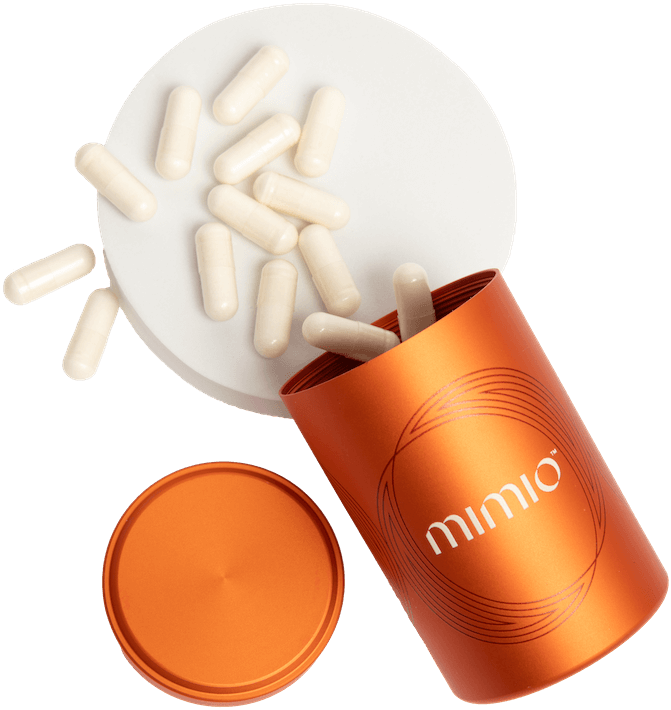Autophagy, derived from the Greek words "auto" (self) and "phagy" (eating), literally means "self-eating." But don’t worry, this isn’t about a zombie apocalypse. Autophagy is a crucial cellular process that helps your body clean out damaged cells and regenerate new ones, ensuring your body functions optimally. Regulating autophagy can have significant benefits for your health and longevity. Let's dive into some effective strategies to master this fascinating process and enhance your cellular health.
Understanding Autophagy
Before we get into the how, let’s briefly touch on the what and why. Autophagy is your body’s way of cleaning house. Think of it as your cells' recycling program, where damaged cell parts, including organelles, are broken down and reused. This process is vital for cellular health, protecting against diseases, and promoting longevity. It kicks into high gear when your body is under stress, such as during fasting or intense exercise. Autophagy includes various forms like macroautophagy, microautophagy, and chaperone-mediated autophagy, all playing unique roles in maintaining cellular homeostasis.
The Science of Autophagy
Autophagy involves several steps and components, starting with the formation of an autophagosome. This double-membrane structure engulfs damaged cellular components and then fuses with a lysosome, where the contents are degraded and recycled. This process is regulated by several key proteins and pathways, including mTORC1 and AMPK (AMP-activated protein kinase).
Macroautophagy vs. Microautophagy
Macroautophagy, often simply referred to as autophagy, is the primary process through which large cellular debris is degraded. It involves the sequestration of cytoplasmic material within autophagosomes, which then fuse with lysosomes for degradation. Microautophagy, on the other hand, involves the direct engulfment of cytoplasmic material by the lysosome through invagination.
Chaperone-Mediated Autophagy
Chaperone-mediated autophagy is a more selective process where specific proteins are targeted for degradation. This process involves molecular chaperones that recognize and deliver the target proteins to lysosomes for degradation.
Key Components in Autophagy
- Autophagosomes
- Autophagosomes are crucial for the autophagy process. These double-membrane vesicles encapsulate damaged cellular components and transport them to lysosomes for degradation.
- Lysosomes
- Lysosomes are cellular organelles that contain digestive enzymes. They fuse with autophagosomes to degrade and recycle their contents.
- mTORC1
- mTORC1 (mechanistic target of rapamycin complex 1) is a key regulator of autophagy. When nutrients are abundant, mTORC1 activity is high, inhibiting autophagy. Under nutrient-deprived conditions, mTORC1 activity decreases, allowing autophagy to proceed.
- AMPK
- AMPK (AMP-activated protein kinase) is another crucial regulator of autophagy. It is activated in response to low energy levels and works to promote autophagy by inhibiting mTORC1.
- Atg Proteins and Atg13
- Atg proteins, including Atg13, are essential for autophagosome formation. These proteins coordinate the steps required to create autophagosomes and ensure the process runs smoothly.
- PAS (Pre-Autophagosomal Structure)
- PAS is the site within the cell where autophagosome formation begins. It acts as a staging ground for the assembly of the autophagosomal membrane.
Regulating Autophagy
Now that we understand the basics of autophagy, let’s explore how we can regulate this process to enhance our health and longevity. Here are some effective strategies:
- Intermittent Fasting
- What It Is: Intermittent fasting involves cycling between periods of eating and fasting.
- How It Helps: Fasting triggers autophagy by putting mild stress on your cells, prompting them to clean up and repair themselves. The 16:8 method (fasting for 16 hours and eating within an 8-hour window) is popular and effective.
- Pro Tip: Start with shorter fasting periods and gradually increase as your body adapts. During fasting, autophagosomes form to help degrade and recycle cellular components, maintaining cellular homeostasis.
- Ketogenic Diet
- What It Is: A high-fat, low-carb diet that puts your body into a state of ketosis.
- How It Helps: Ketosis, similar to fasting, induces autophagy by depriving your cells of glucose and forcing them to utilize fats for energy. This process is regulated by key pathways, including mTORC1 and AMPK (AMP-activated protein kinase).
- Pro Tip: Focus on healthy fats like avocados, nuts, and olive oil.
- Exercise Regularly
- What It Is: Engage in regular physical activity, including both aerobic and resistance training.
- How It Helps: Exercise stresses your cells and promotes autophagy, helping to clear out damaged cellular components. This includes macroautophagy, which involves the formation of autophagosomes.
- Pro Tip: Mix up your routine with a combination of cardio and strength training for optimal benefits.
- Nutrient Modulation
- What It Is: Adjusting your nutrient intake to promote autophagy.
- How It Helps: Reducing protein and amino acid intake intermittently can trigger autophagy. Specific nutrients like spermidine, found in foods like wheat germ and mushrooms, can also enhance the process by affecting molecular mechanisms.
- Pro Tip: Incorporate autophagy-promoting foods like green tea, turmeric, and coffee into your diet. These foods can support the regulation of autophagy through pathways like AMPK and mTORC1.
- Supplements
- What It Is: Using specific supplements known to enhance autophagy.
- How It Helps: Supplements like resveratrol, quercetin, and NAD+ precursors can support and enhance autophagy. Additionally, supplements can aid in the selective autophagy of damaged organelles.
- Pro Tip: Always consult with a healthcare provider before starting any new supplement regimen.
The Role of Autophagosome Formation and Degradation
Autophagy involves the formation of autophagosomes, which are double-membrane structures that engulf damaged cellular components. The autophagosomes then fuse with lysosomes, where the contents are degraded and recycled. This process is critical for maintaining cellular homeostasis and preventing the accumulation of cellular debris. Atg proteins, including Atg13, play a crucial role in the formation of autophagosomes.
Selective Autophagy
Selective autophagy refers to the targeted degradation of specific cellular components, such as damaged mitochondria or misfolded proteins. This process is essential for maintaining cellular homeostasis and preventing the buildup of potentially harmful substances within the cell. Key players in selective autophagy include specific autophagy receptors that recognize and target the unwanted components for degradation.
Insights from Mimio
At Mimio, we’re committed to harnessing the power of autophagy through innovative research and cutting-edge supplements. Our biomimetic supplements are designed to mimic the effects of fasting, providing your cells with the support they need to thrive, even during a meal. By integrating these scientifically-backed solutions into your routine, you can maximize the benefits of autophagy and enhance your overall health and longevity.
The Importance of Cellular Homeostasis
Autophagy plays a vital role in maintaining cellular homeostasis, which is the balance of cellular processes that keep cells functioning optimally. Disruptions in autophagy can lead to the accumulation of damaged organelles and proteins, contributing to various diseases, including neurodegenerative disorders and cancer. Therefore, regulating autophagy is crucial for preserving cellular health and preventing disease.
The Molecular Mechanisms of Autophagy
Autophagy is a complex process regulated by various molecular mechanisms. Key regulators include:
- mTORC1
- mTORC1 inhibits autophagy under nutrient-rich conditions. When nutrients are scarce, mTORC1 activity decreases, allowing autophagy to proceed. This pathway is essential for balancing growth and degradation in cells.
- AMPK
- AMPK is activated in response to low energy levels and promotes autophagy by inhibiting mTORC1. It acts as an energy sensor, ensuring that cells initiate autophagy during periods of metabolic stress.
- Atg Proteins and Atg13
- Atg proteins, including Atg13, are essential for autophagosome formation. They coordinate the assembly of the autophagosomal membrane and ensure the proper progression of autophagy.
- PAS (Pre-Autophagosomal Structure)
- PAS serves as the initiation site for autophagosome formation. It assembles the necessary components to form the autophagosomal membrane, acting as a scaffold for the process.
Enhancing Autophagy Through Lifestyle Changes
Several lifestyle changes can enhance autophagy and promote cellular health. Here are some practical tips:
- Incorporate Intermittent Fasting
- Intermittent fasting can significantly boost autophagy. Try different fasting protocols, such as the 16:8 method, to find what works best for you.
- Adopt a Ketogenic Diet
- A ketogenic diet can induce autophagy by mimicking the metabolic state of fasting. Focus on healthy fats and maintain low carbohydrate intake to achieve ketosis.
- Engage in Regular Exercise
- Regular physical activity, especially high-intensity interval training (HIIT), can stimulate autophagy. Combine aerobic exercises with strength training for optimal results.
- Optimize Nutrient Intake
- Include foods rich in autophagy-promoting nutrients, such as green tea, turmeric, and coffee. These foods can activate pathways like AMPK and mTORC1, enhancing autophagy.
- Consider Autophagy-Enhancing Supplements
- Supplements like resveratrol, quercetin, and NAD+ precursors can support autophagy. Consult with a healthcare provider to determine the best supplements for your needs.
Research on Autophagy
Research on autophagy has provided valuable insights into its role in health and disease. Studies have shown that autophagy is essential for:
- Neuroprotection
- Autophagy helps clear damaged proteins and organelles from neurons, protecting against neurodegenerative diseases like Alzheimer's and Parkinson's.
- Cancer Prevention
- Autophagy can prevent the accumulation of damaged cellular components that may contribute to cancer development. It also plays a role in tumor suppression.
- Longevity
- Autophagy promotes longevity by maintaining cellular health and preventing the buildup of damaged proteins and organelles. Studies in model organisms have shown that enhanced autophagy can extend lifespan.
The Future of Autophagy Research
The future of autophagy research holds promise for new therapeutic approaches to treat various diseases. Scientists are exploring ways to modulate autophagy for:
- Neurodegenerative Diseases
- Developing drugs that enhance autophagy could provide new treatments for diseases like Alzheimer's and Parkinson's.
- Cancer Therapy
- Targeting autophagy pathways may offer new strategies for cancer treatment, either by enhancing autophagy to clear cancer cells or by inhibiting autophagy to make cancer cells more vulnerable to therapy.
- Aging and Longevity
- Understanding how autophagy contributes to aging could lead to interventions that promote healthy aging and extend lifespan.
Conclusion
Regulating autophagy is like having a personal janitor for your cells, ensuring they stay clean, functional, and ready to fight off diseases. Through intermittent fasting, a ketogenic diet, regular exercise, nutrient modulation, and targeted supplements, you can effectively manage and enhance this vital process. Remember, it’s all about balance and consistency. Start with small changes, listen to your body, and gradually build up to more intensive practices. Here’s to cleaner cells and a healthier, longer life!



